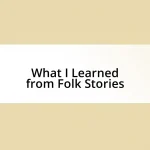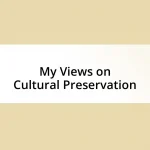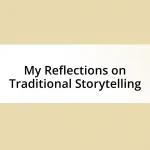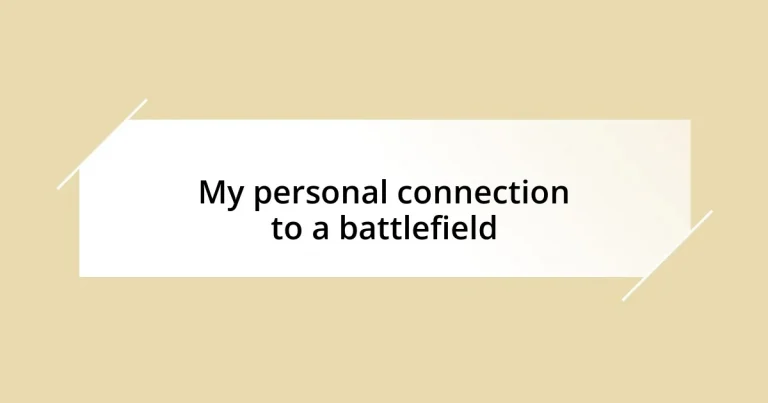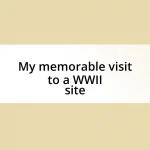Key takeaways:
- Visiting battlefields evokes profound emotional connections and reflections on humanity’s resilience and sacrifices.
- Personal family military histories create a deep sense of pride and a reminder of the significance of freedom and values.
- Engaging with fellow visitors fosters connections and shared stories that enhance understanding of collective history.
- Nature’s reclamation of battlefield sites symbolizes hope and healing, illustrating that life and peace can emerge from past sorrow.
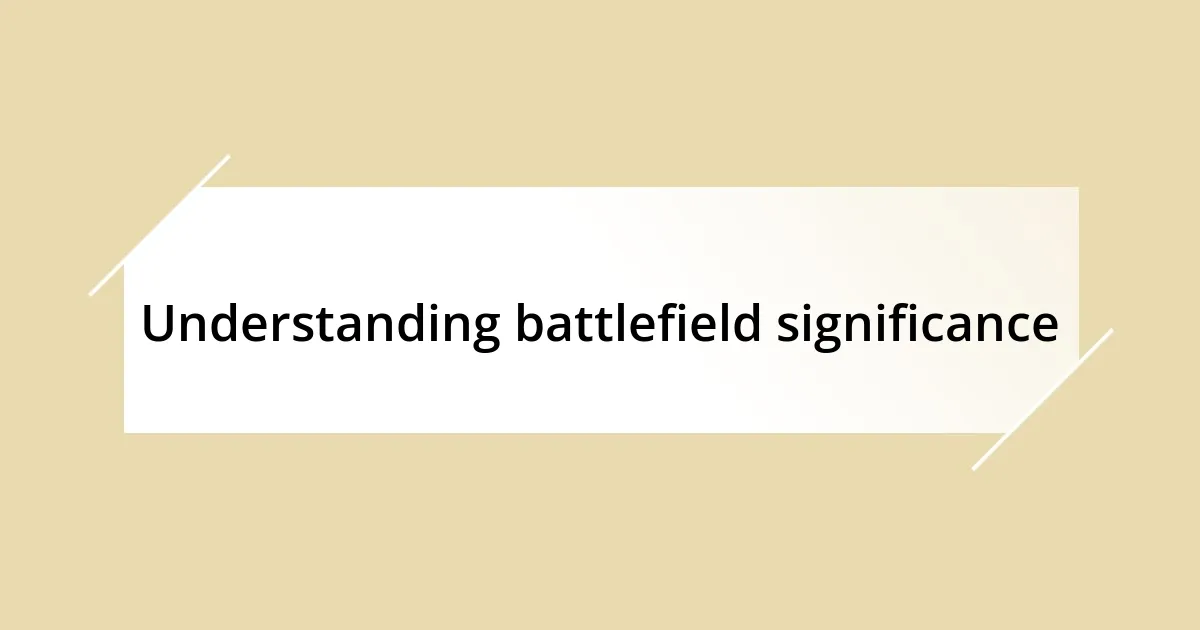
Understanding battlefield significance
When I first stood on the grounds of a battlefield, I felt an overwhelming sense of history enveloping me. It’s more than just a location; it’s a testament to the struggles and sacrifices made by countless individuals. Have you ever felt a chill run down your spine when realizing that the very soil beneath your feet was once stained with the blood of warriors?
Each battlefield carries with it the weight of stories that shaped nations. Personally, reflecting on these events brings a profound connection to my own values and beliefs. I often think about how these historical conflicts highlight humanity’s resilience amidst despair; isn’t it fascinating how a single site can represent both tragedy and triumph?
I’ve noticed that visiting a battlefield evokes a mix of emotions—sorrow, pride, and even hope. It’s not just about the physical ground; it’s about understanding the significance behind those moments in time. How do we process these emotions? For me, it often leads to a deeper appreciation of peace and the ongoing struggle for justice; understanding this significance compels us to honor the past, so we can shape a better future.
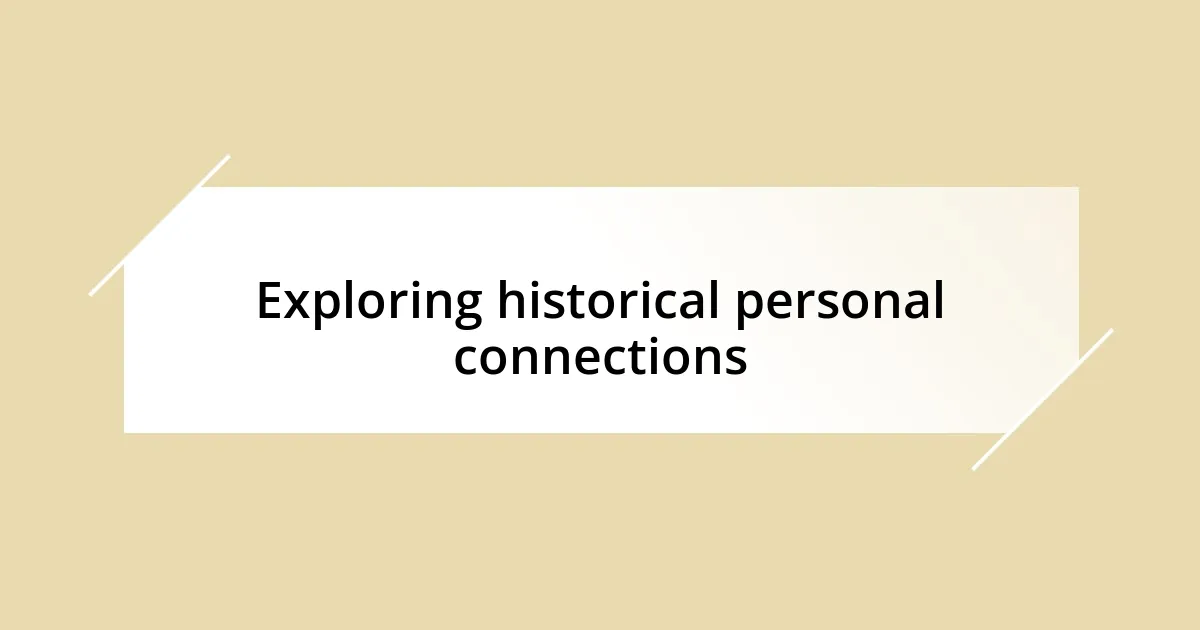
Exploring historical personal connections
It’s interesting how visiting historical sites can create emotional ties that linger long after you’ve left. I remember standing at Gettysburg, overwhelmed by the sheer scale of the events that happened there. I could almost hear the echoes of voices from the past, each carrying a piece of the narrative that sculpted a nation. Reflecting on these moments allows me to appreciate not just the battles fought, but the enduring spirit of those who stood their ground, often against incredible odds.
- Personal stories of resilience emerge, reminding us of shared humanity.
- The presence of memorials transforms the space into a sacred ground of remembrance.
- Such experiences can instigate deep conversations about the values we hold today.
- Encounters with like-minded visitors can spark unexpected connections and insights.
There’s something magical in the air at these historic battlefields that triggers a sense of reverence within me. I recall visiting the beaches of Normandy, where the weight of sacrifice hit me like a tidal wave. Standing there, I pondered the dreams of those young soldiers who fought for freedom, many of whom would never return home. That knowledge fosters a profound appreciation in me for the peace I enjoy in my daily life, reminding me to carry their legacy forward in everything I do.
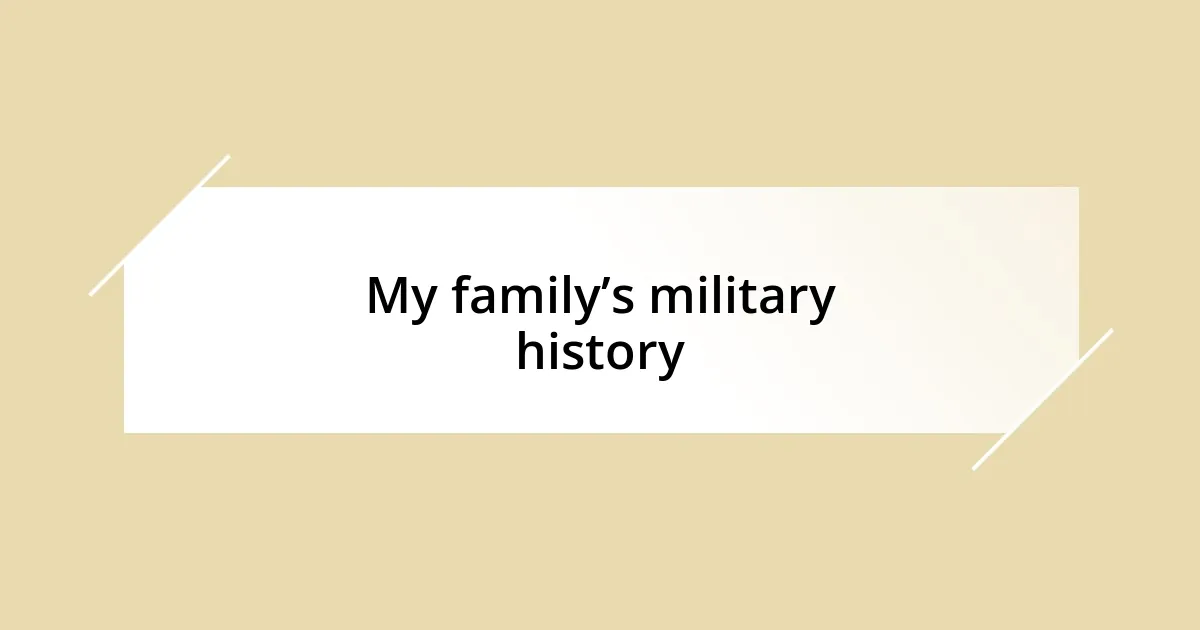
My family’s military history
One of the most striking aspects of my family’s military history is the legacy of service that has been passed down through generations. My great-grandfather served in World War I, and his stories have always fascinated me. When I was a child, he would sit me on his knee and share tales of valor and camaraderie, painting vivid pictures of life in the trenches. Those tales made me acutely aware of the sacrifices made—not just by him, but by countless families who faced uncertainty during those tumultuous times.
Similarly, my grandfather fought in World War II. One summer, while sorting through family albums, I stumbled upon a faded photograph of him in uniform, an image that spoke volumes without uttering a word. His eyes, full of determination, reflected the struggles he faced while stationed overseas. It struck me how intertwined our narratives are; these moments of history don’t just belong to the past, they ripple through time, shaping who I am today and reminding me of the significance behind our freedoms.
Looking at my family tree, I’m proud to see a powerful lineage of service. Each member, compelled by their own reasons, donned a uniform and answered the call to defend our values. As I reflect on their experiences, I can’t help but feel a mix of pride and humility. Their sacrifices motivate me to uphold the principles they fought for, reminding me that my own journey carries echoes of their bravery.
| Family Member | Conflict |
|---|---|
| Great-Grandfather | World War I |
| Grandfather | World War II |
| Father | Vietnam War |
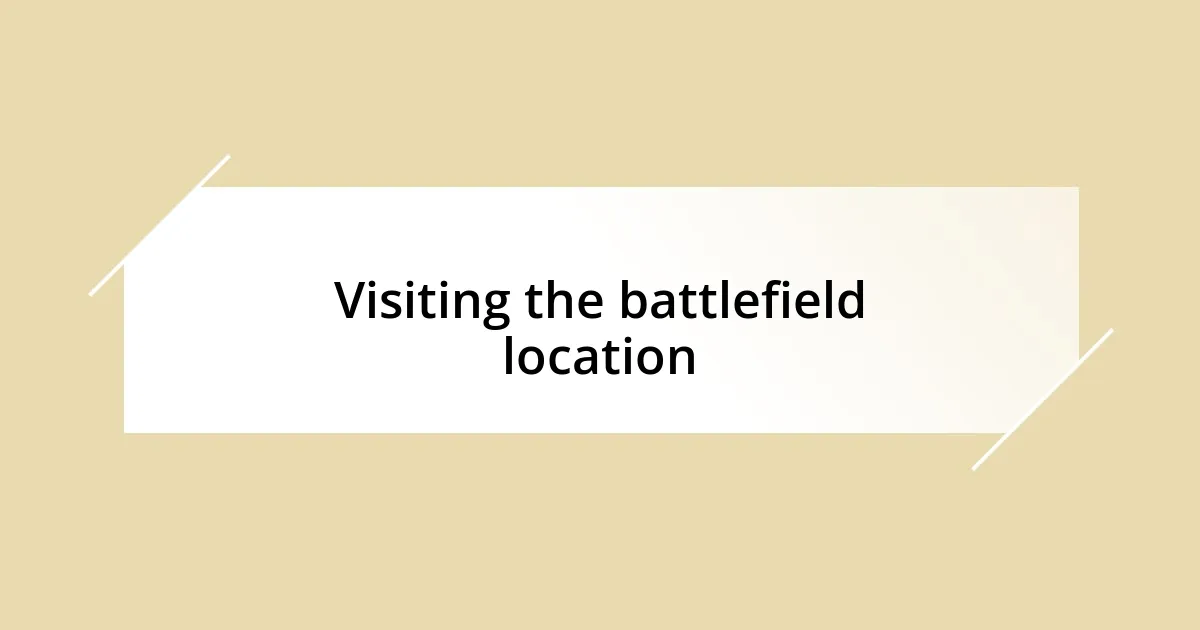
Visiting the battlefield location
Walking the grounds of a battlefield can be an intensely personal experience. I remember my visit to Antietam, where I could feel the weight of history under my feet. As I traced the path of the soldiers, I imagined their thoughts and fears amidst the chaos. Have you ever felt the presence of those who came before you? It’s a palpable connection that leaves an imprint on your heart.
I found myself standing by the Dunker Church, where the cries of the wounded seemed to echo even now. In that moment, I was struck by how these hallowed grounds serve as a reminder of the fragility of peace. As I gazed across the fields, filled with wildflowers dancing in the breeze, I couldn’t help but think about the stark contrast to the violence that once unfolded there. It makes me wonder—what stories do these landscapes hold?
During my visit to the battlefield, I joined a guided tour led by a passionate historian. Hearing the personal accounts shared by others in the group added layers to my understanding. Each visitor brought their own perspective, sparking rich discussions that deepened my appreciation for the past. Have you ever noticed how sharing these experiences can forge unexpected bonds? It reminded me that our connections, both with history and each other, are what make these visits truly unforgettable.
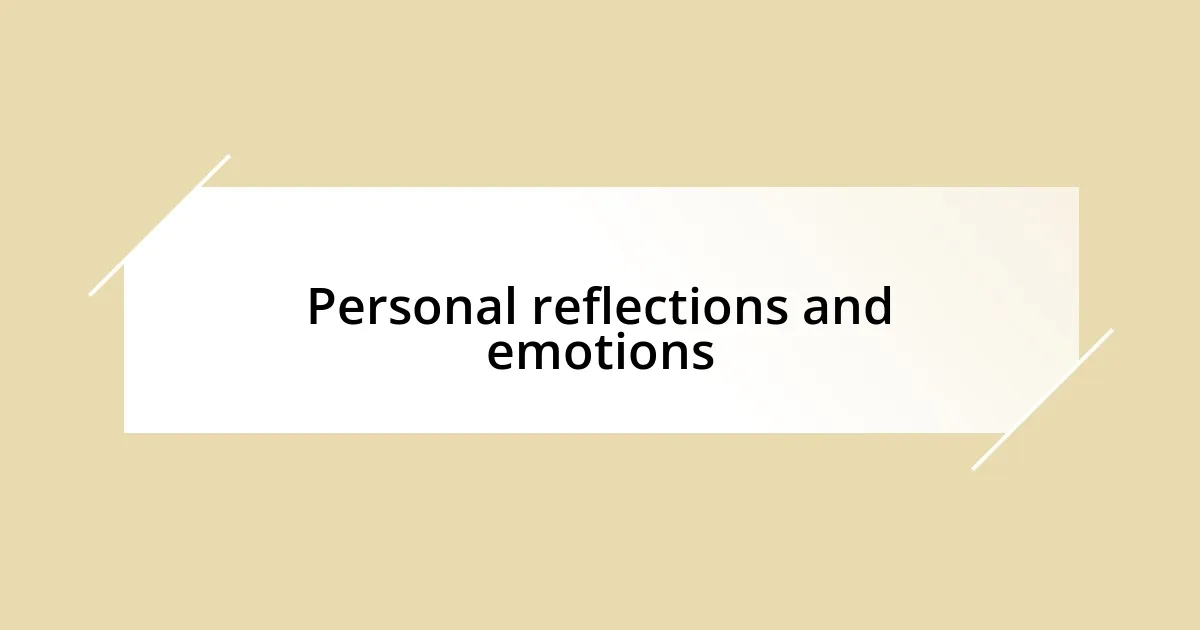
Personal reflections and emotions
Reflecting on the emotions that surged through me during my battlefield visit, I felt an overwhelming sense of reverence. I vividly recall standing alone in a quiet corner, where a solitary tree stood guard over the past—a silent witness to the lives changed and lost. How often do we pause to consider the stories woven into the very ground we walk upon? That realization struck me profoundly, reminding me that each step was not just a physical journey but a connection to something much larger than myself.
During that visit, I was hit by an unexpected wave of sadness when I read about a local soldier who had never returned home. The weight of his unfulfilled dreams and the ache of his family’s loss hung in the air. How do we truly honor those who made the ultimate sacrifice? In my heart, I quietly vowed to carry that story forward, weaving his memory into my own life’s narrative, and in doing so, I felt an emotional bond with everyone who had walked that path before me.
As I navigated through the preserved fields, surrounded by the beauty of nature, I was struck by a haunting juxtaposition—the serenity of today versus the chaos of yesterday. It made me ponder: what does it mean to truly appreciate peace? I realized that each moment of silence was both a celebration and a commemoration. Engaging with this history at a deeply personal level allows me to honor not only the soldiers of my family but all those who have fought and struggled for the freedoms we enjoy today.
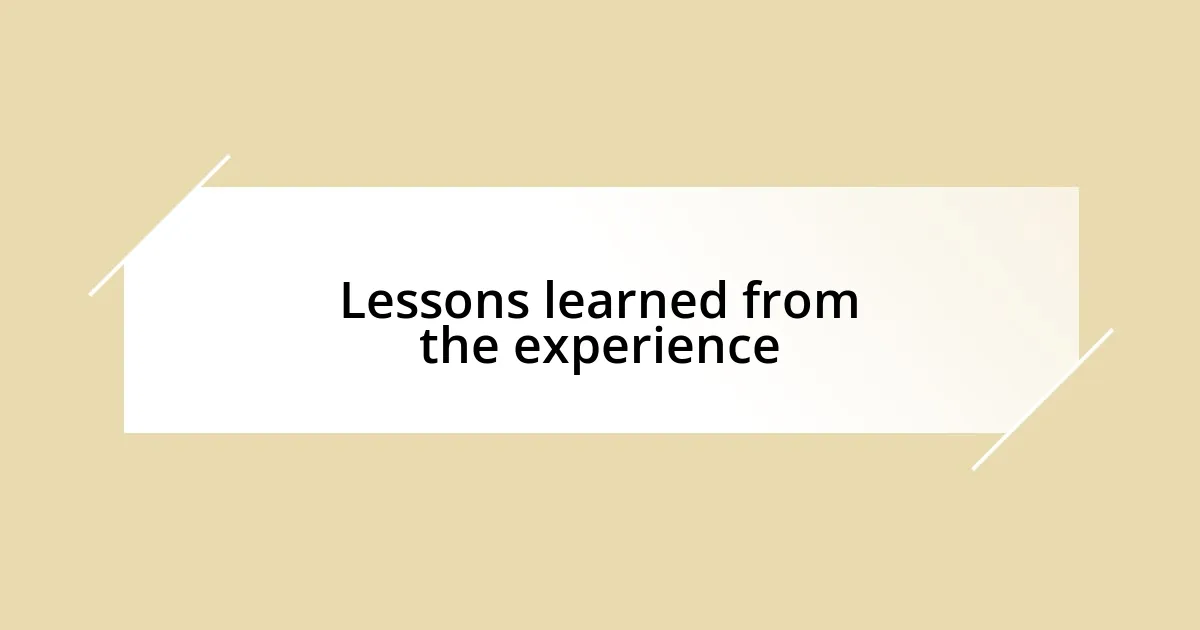
Lessons learned from the experience
Standing there, I learned that history is not just a collection of dates and events; it’s a living tapestry of human emotions and experiences. I recall the moment I stumbled upon a small memorial, dedicated to a lesser-known regiment. It hit me that these soldiers had families, dreams, and fears too. How often do we overlook their stories, buried in the vast narratives of wartime? Each one of them challenged me to reflect on the value of every individual life in the grand scheme of history.
Engaging with fellow visitors during my time at the battlefield, I discovered that sharing personal stories can be incredibly healing. One woman recounted her grandfather’s experiences, and I felt an overwhelming sense of connectedness. It was as if, in that moment, we were bridging our pasts together. How does sharing our stories impact our understanding of collective history? I realized that these conversations can spark change—not just in how we view history, but in how we relate to one another in the present.
The battlefield experience taught me about resilience and healing. As I observed nature reclaiming the land, it struck me that life continues despite the scars of the past. I remember watching children play near the same fields where battles raged, laughter echoing in the air. It made me ponder: can we find hope amidst the remnants of sorrow? That beautiful contrast reaffirmed that, from pain, something new and wonderful can emerge—just like peace can thrive if nurtured with understanding and compassion.


